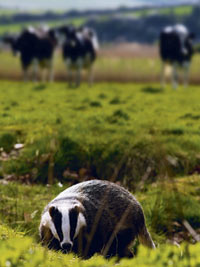TB consultation: Campaigners expected to challenge English badger cull
 DO NOT RE-USE
DO NOT RE-USE Animal welfare campaigners are likely to launch a legal challenge against government plans to let English farmers combat bovine tuberculosis by culling badgers.
The Badger Trust, which successfully took legal action to halt culling in Wales, is now considering similar action in England. Legal representatives are already looking at the consultation, searching for possible loopholes on which to hang their case.
“It is too early to say for sure, but the proposals look very scrappy and piecemeal,” said Badger Trust spokesman Jack Reedy. “We are studying the consultation document carefully.”
Describing the proposals as highly selective, Mr Reedy said licensing farmers to kill badgers within restricted areas was doomed to failure. The government itself had acknowledged that culling would only be effective if it was widespread.
“How that is going to be achieved through piecemeal licensing frankly defies comprehension,” said Mr Reedy. Culling was almost certain to spread the disease by displacing infected badgers to areas previously free from TB.
The RSPCA has also warned that culling may have a limited benefit. In areas outside the cull, it too claimed that TB in cattle might actually increase. “We also have concerns on how culling might be carried out,” said a spokesman.
Instead, the government should press ahead with its planned vaccination project. “We also want to see a continuation of improved cattle measures, including pre- and post-movement testing, husbandry and biosecurity.”
Farmers and politicians in Wales will be watching the developing situation in England with interest. An announcement on bovine TB eradication in Wales is expected when the Welsh Assembly returns from its summer recess next week.
A Welsh Assembly Government spokesman said the cost of TB to the government and the taxpayer remained significant. “We need to eradicate this disease as quickly as possible through a comprehensive approach,” he added.
“We have a common disease and similar regional patterns of that disease. We all recognise the importance of a comprehensive programme to tackle the disease in all species – including wildlife.”
